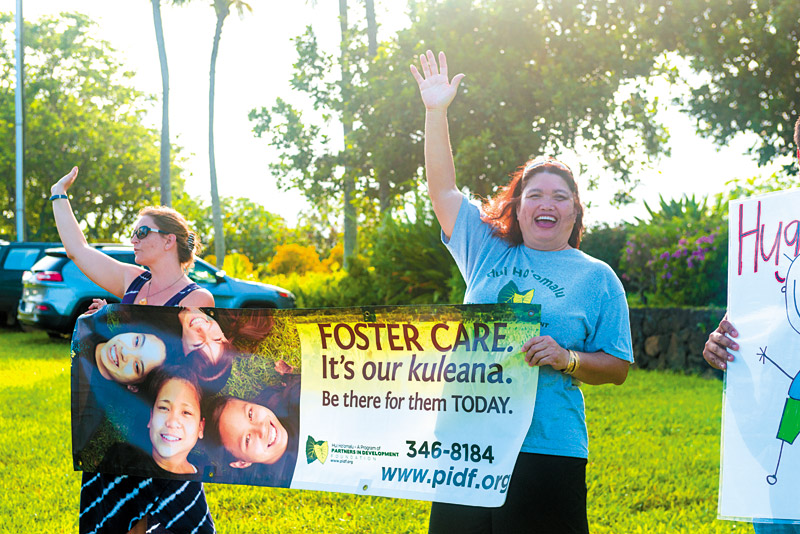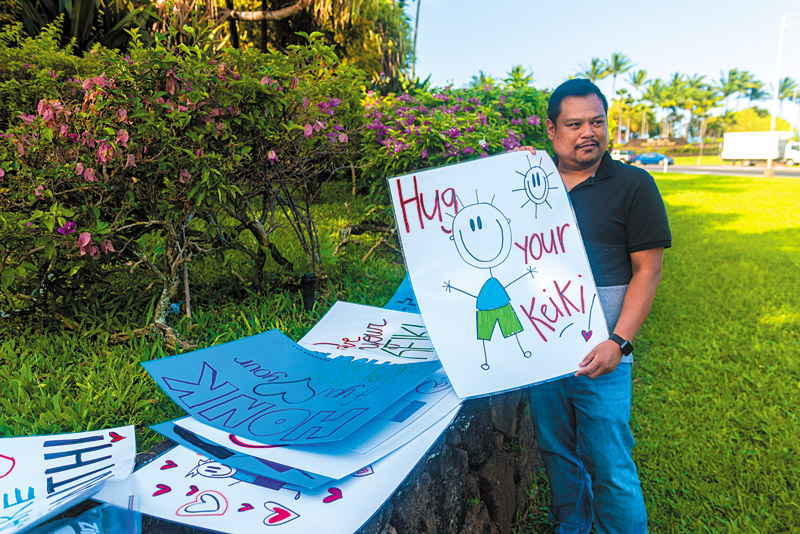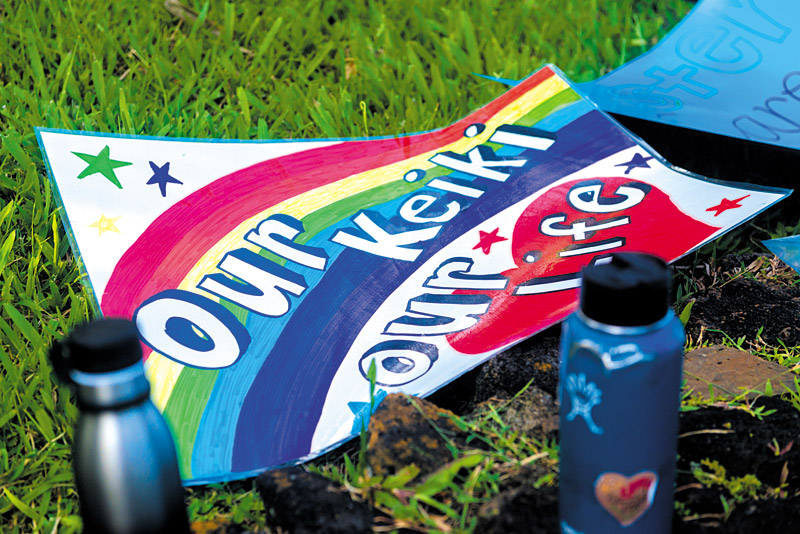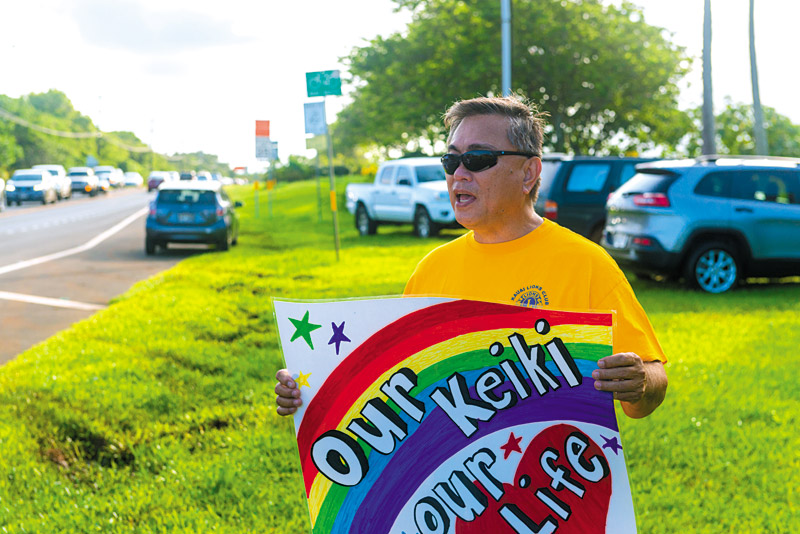Fostering Connections
Jeffrey Venzon was one of a handful of people gathered at the intersection of Ahukini Road and Kapule Highway in support of Hui Ho‘omalu last month. Volunteers were holding signs and waving at drivers to help raise awareness for the program, which is currently in need of more resource care-givers (formerly known as foster parents). Venzon was a resource caregiver for many years, and he still supports and believes in the group’s mission to assist keiki.
“You need a lot of patience — understanding that they went through a lot already,” says Venzon, who opened his home to teenagers and a 5-year-old boy. Venzon initially started as a foster parent through the Child Welfare System before joining Hui Ho‘omalu.
Taking care of other people’s children who are coming from troubled situations isn’t easy, but the act is an honorable undertaking, he adds. The act is rewarding unto itself, but it also instills positive attributes like compassion.
He chose to help keiki from broken homes because he was also serving as a coach at the time and wanted to get them involved in community activities. He fondly remembers helping one child join the Pop Warner football league.
“And he came out a star player,” says Venzon. “When he played, he gave it all he got.”
While Venzon is no longer fostering keiki, he still wants to encourage others to do so, especially since there’s a great need for resource caregivers willing to accept teenagers and sibling groups into their homes.
“It can be challenging,” says Monica Ka‘auwai, Hui Ho‘omalu’s community liaison and the program’s only employee on Kaua‘i. “It all boils down to the fact that it’s not their fault, it’s what they went through before they went into foster care.”
Proper training, provided by Hui Ho‘omalu, allows resource caregivers to become well-equipped with the knowledge and tools to handle certain behaviors, as kids come from a variety of disjointed situations and range in age from birth to 18. Prior to entering foster care, these children experience traumatic events — in which police and social workers get involved to remove them from the dangerous situations — which can include physical and sexual abuse, neglect, and/or parental drug or alcohol abuse. A licensed social worker then seeks a home and works with Hui Ho‘omalu to find a cohesive match with a licensed resource caregiver.
During the period of time when the child is living under a resource caregiver’s roof, the biological family is simultaneously receiving help in the form of parenting classes or drug rehabilitation. This process could take anywhere from one month to up to a year.
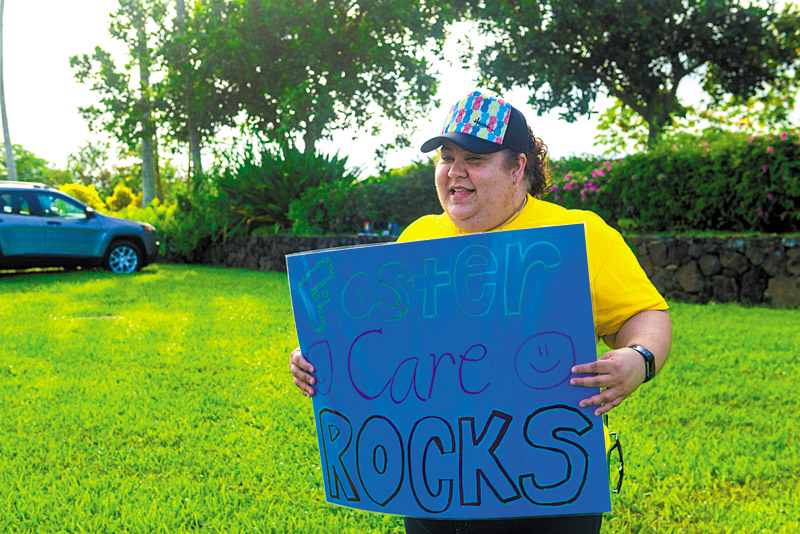
Muriah Moises and Jeffrey Venzon hold pro-foster care signs to encourage the community to sign up with Hui Ho‘omalu to become licensed resource caregivers.
“The goal is reunification,” says Ka‘auwai.
Resource caregivers often fall between the ages of 30 and 50, are established within their careers and have had some kind of experience caring for children. But people of all ages, experiences and backgrounds, including single or married, male or female, are welcome to participate.
“We look for families who are willing to open their hearts and homes to other children not related to them,” says Ka‘auwai.
All caregivers must complete a 60to 90-day process that includes background and medical checks, personal references, and an 18-hour training course that is broken down into face-to-face meetings and videos. A license is issued by the state Department of Human Services after these tasks are completed and an inspection of the caregiver’s household is conducted to ensure a safe environment, no exposed drugs or alcohol, and enough room for a child, including a bed, dresser and place to do homework. Care-givers may also choose their preferences, such as the age of the child.
Hui Ho‘omalu is one of many programs that fall under Partners in Development Foundation, which uses traditional cultural values to help families achieve success in life. The mission of the program, which was awarded a contract from DHS, identifies, recruits, trains and supports resource caregivers who are willing to provide a safe space for keiki.
“That satisfaction of helping young children and then helping them be in a safe place while their parents can get their act together before reunifying, that’s what keeps me going,” says Ka‘auwai.
The Kamehameha Schools graduate says the job is a natural fit, as she has always had an affinity for working with children and families. Prior to her current position, she was a preschool director and teacher for nearly two decades.
With about 100 kids currently in care right now, and about 80 resource caregivers, Ka‘auwai’s focused on recruiting more people and often attends events or will even stand at busy intersections with Hui Ho‘omalu banners in tow. People like Venzon contribute to her mission, as do organizations such as Kaua‘i Lions Club that sends representatives like Muriah Moises to participate in sign-waving events. Lions also donate slippers for the children and duffel bags. Seeing all the volunteers who have a heart for keeping Kaua‘i’s families healthy make it all the more rewarding for Ka‘auwai.
She appreciates every little thing that people can do to help her mission at Hui Ho‘omalu, but says it’s becoming a resource caregiver that really makes the most significant impact.
“Take care of the keiki o ka ‘āina on Kaua‘i,” says Venzon. “This is a very noble cause.”
Visit pidf.org or call Ka‘auwai at 346-8184 for more information.


